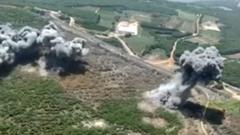As Pakistan prepares to determine its next government in a general election on Thursday, concerns are intensifying about electoral irregularities. A growing body of evidence points to election manipulation and political interference by the Pakistani military.
Pakistan was supposed to go to polls last year. The country’s constitution has five-year terms for both the national and provincial assemblies as well as for the post of the prime minister. When the former Prime Minister Imran Khan’s government was toppled in a parliamentary coup backed by the Pakistani military and the U.S. State Department in 2022, it was only in its fourth year.
Since then, the Pakistani military has ruled from the shadows, trying to delay the inevitable elections while at the same time trying to ensure that the massively popular former prime minister Khan and his party Pakistan Tehreek e Insaf, or PTI, do not come back to power.
Inside Pakistan, the media is completely muzzled. Outside Pakistan, the upcoming elections are being called the “least credible in the country’s history,” and “more like a coronation,” where the military is understood merely to be choosing a new civilian face for its rule. While the U.S. State Department has consistently said that it has not made a determination about the fairness of Pakistani elections, the events leading up to the elections have not gone unnoticed in Congress.
“Threats to free and fair elections anywhere is concerning. In light of recent events in Pakistan and the upcoming election, let’s be clear: promoting stability, democracy, and human rights around the globe is paramount to maintaining our values worldwide,” posted Republican Rep. Nathaniel Moran on Twitter.
“There can’t be free and fair elections when one of the opposition parties has been criminalized,” posted Democratic Rep. Ilhan Omar, echoing his sentiments from across the political aisle.
The publicly visible instances of election rigging — visible, that is, to all but the Biden administration — are too numerous to articulate in a single article. What follows are the most egregious.
Banning the Leading Party’s Symbol
On a Pakistani ballot paper, each political party has an electoral symbol. Candidates in each of Pakistan’s hundreds of constituencies have their party symbols next to their names, a critical guide for the substantial portion of the electorate that can’t read. PTI candidates were stopped from using their unified electoral symbol — a cricket bat — by the court, based on a technicality no other party was subjected to. This means each PTI candidate is assigned a random symbol and has to run an individual campaign.
With the loss of its bat, PTI was converted from a formidable political party to a loose group of individuals with no legal affiliation overnight, effectively disenfranchising millions of citizens who placed their trust in PTI as a political entity. The move has been severely criticized as a “huge blow to fundamental rights” by the Pakistani legal fraternity and civil society.
The implications of this go even further. If, by some miracle, PTI candidates overcome all the obstacles and win a majority in the parliament, the technically unaffiliated candidates would be missing key legal protections and could be vulnerable to bribes and coercion by the military.
Shutting Down the Internet
The Pakistan Telecommunication Authority is now chaired by a retired general. The chair of PTA has the ability to shut down the whole country’s internet or specific websites on a moment’s notice. He has shut down social media and the internet every time Khan’s PTI held an election-related event online in the past few months, affecting more than a 100 million users.
The Pakistani media has already expressed concerns that the internet might be shut down on election day to discourage people from voting. Lending credibility to those concerns, a top minister on Tuesday hinted at the possibility of internet shutdown on election day, alarming human rights organizations including Amnesty International and prompting them to write an open letter and put out a statement.
“Amnesty International, along with several other human rights organizations, call on Pakistani authorities to guarantee uninterrupted access to the internet and digital communication platforms for everyone across the country,” the statement read.
Banning and Jailing the Leading Candidate
The charges against ousted prime minister Khan range from incoherent to absurd. He was charged with “exposing state secrets” for publicly discussing the contents of the secret cable that The Intercept reported on last year. He was slapped with a seven-year sentence for what the Supreme Court said was an invalid marriage. And he got 14 years for supposedly keeping state gifts without filing the proper paperwork or compensating the state, though all evidence suggests that he did so.
Three major court decisions in quick succession just before the elections has been seen inside Pakistan as a message from the Pakistani military establishment. The message is intended not only for the voters but also for the candidates, signaling the influence and control wielded by the military.
Hacking the Election Management System
Just two days ago, a local electoral official complained in a letter circulated to the Election Commission of Pakistan that key software used in managing elections was behaving oddly. In the letter, the official cites specific issues with the software and claims that data related to its staff was erased. “This weakness of system has created many issues and also raises question mark on the reliability and validity of the tool/ software. This shows that either the [Election Management System] is a utter failure or there is a someone else [sic] that controls and manages the system behind the veil,” he wrote in the document leaked online.
The EMS was built by NADRA (National Database Registration Authority), a government department that is usually headed by a civilian but, since last year, has been run by a general in the military. NADRA is the primary custodian of all of Pakistan’s data — from population and demographic data to voter rolls — and is supposed to play a key role in conducting elections along with the ECP. As long as the Pakistani military has direct control of NADRA, it controls all the systems used to administer elections and transmit their results.
Terrorist Violence
Last week, ten PTI activists were killed in a bomb blast at an election rally in Balochistan province. The same week a PTI candidate and a senior leader were shot dead in Khyber Pakhtunkhwa province in separate incidents. In Karachi, a PTI candidate’s car was shot at. According to a statement from the UN High Commissioner for Human Rights, there have been “no less than 24 reported instances” this year in which armed groups have attacked political parties in Pakistan ahead of the elections.
At least one of these deadly attacks was claimed by ISKP, the Afghan chapter of ISIS, which has never specifically targeted the PTI in the past.
Police Raids
When the elections were announced, there were several reports that unknown people and masked government officials were snatching the nomination papers of PTI candidates as soon as they would go to file them, thereby preventing them from filing to run before the deadline. Of the candidates who did manage to file, those who were not arrested faced frequent police raids on their homes.
During one raid at a political candidate’s home, an American police officer who happened to be vacationing in Pakistan was also arrested. He was subsequently released following intervention by the U.S. embassy. In another police raid on a political activist’s house, the activist’s father suffered a heart attack and died.
Virtually every notable PTI member’s house has been raided and ransacked. In addition, PTI rallies and meetings have also been violently shut down by the police and scores of workers have been arrested. In one constituency in northern Pakistan, there were reports of police shooting at a PTI rally. On Tuesday, the last day of campaigning, almost every PTI rally was attacked by police. In a video that went viral on social media, a PTI candidate, Zartaj Gul Wazir, is seen sitting on the road, crying, after a police attack on her rally. In other areas that have not been so violent, comical social media videos of police chasing PTI activists through streets have emerged.
In PTI strongholds, there are even reports of police ticketing people in unusually high numbers and confiscating their identification cards, which won’t be returned until after the election, meaning that they will be unable to vote.
Abducting Candidates and Their Families
There are reports of PTI candidates being abducted by unknown men and returning home only after announcing their withdrawal from the race. Most notably, a female PTI candidate, Iffat Tahira Soomro, was abducted and forced to step down under duress. She was the second candidate in the constituency to step down. PTI has now pitched a third candidate for the same seat.
In another incident, a PTI candidate’s elderly father was picked up from his house to pressure him into leaving the party. After four days, the father died in police custody.
The UN Commission on Human rights deplored these incidents in their statement on Tuesday. “We are disturbed by the pattern of harassment, arrests and prolonged detentions of leaders of the Pakistan Tehreek e Insaf (PTI) party and their supporters which has continued during the election period,” the statement read.
Voter Suppression
PTI has been counting on high voter turnout to counter the efforts to manipulate the elections. But by reducing the number of polling stations in key constituencies, the government is effectively suppressing votes in those areas.
There are polling stations that used to have a few thousand voters assigned to them but will now have tens of thousands of voters. One polling station in Lahore that used to have only eight thousand constituents has ballooned to 29 thousand, including thousands of young and first-time voters from all over Lahore. In some constituencies in Karachi, so many people have been assigned to each polling station that with a 50 percent turnout (roughly the total turnout for the last election), each voter will get only one minute and 13 seconds to vote.
Can PTI Still Win?
Despite the gloomy verdict, a sense of hope persists among many in Pakistan. Nothing illustrates this contradiction more than two women, Dr. Yasmin Rashid and Aliya Hamza, who are contesting elections from jail. These two political prisoners, running their campaigns from incarceration and against all odds, have become symbolic figures representing resistance against military interference in Pakistani democracy.
“The election in Pakistan is going to be a referendum against the establishment – a local euphemism for Pakistan Army – and its associated partners,” says Hussain Nadim, an analyst and former policy specialist working with the Pakistani government. “This is why despite all efforts by the establishment otherwise, we can forecast a historic turnout in the elections. The brazen electoral rigging, persecution of political leaders, and sham court trials have substantially increased the stakes,” he added.
In the week leading up to the elections, Khan has been sentenced to a cumulative 31 years in prison. His political party confronts the imminent risk of outright prohibition, with his motley crew of candidates on the run, evading authorities, attempting to canvass for votes clandestinely (and even using AI).
Yet, PTI has resisted calls to boycott the election. The goal, they say, is to win in such dramatic and runaway fashion that even all of the above can’t steal it.
The post 8 Flagrant Ways the U.S-Backed Government in Pakistan Is Subverting the Election appeared first on The Intercept.

 2 months ago
45
2 months ago
45


